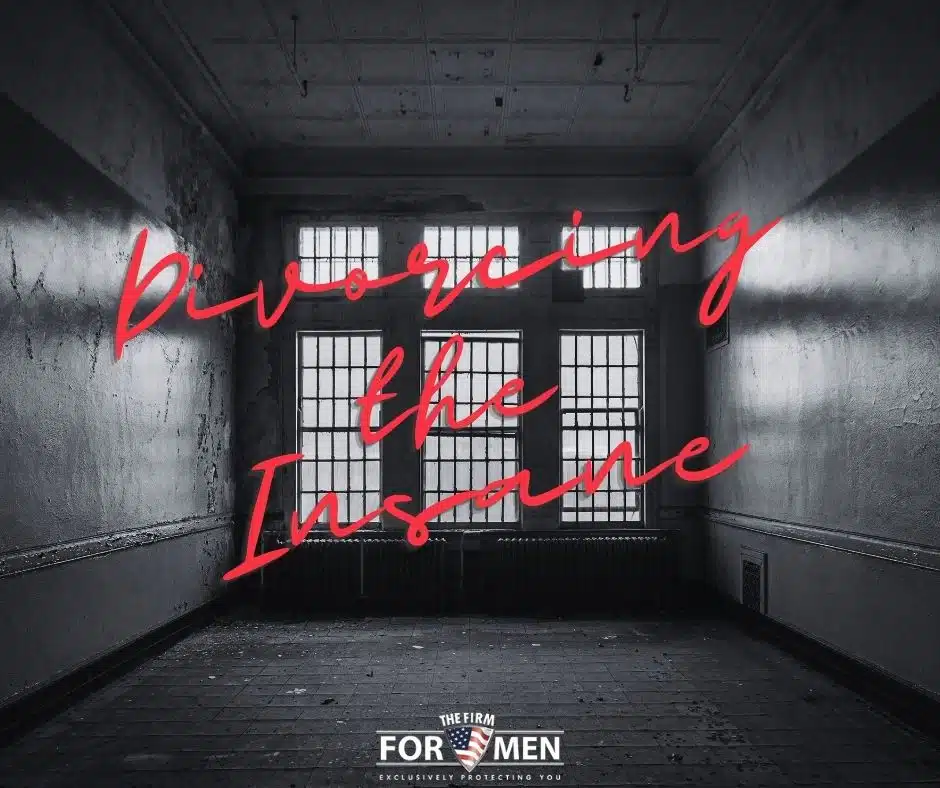Would you rather be accused of psychosis or insanity? We use both terms in casual conversation, but only “psychosis” is a medical term; insanity is exclusively a legal label, despite Hollywood’s best efforts. Virginia has no statutory definition of insanity. The term only exists in case law. Still, people do suffer mental illness, and sometimes a rational person needs to divorce a person legally “adjudged insane.”
Jump to a Section
- You Think Your Wife is “Insane”
- Pleading Insanity During a Divorce
- Guardian ad litem for the Mentally Incompetent
- Moving the Divorce Forward
You Think Your Wife is “Insane”
Your spouse may be psychotic, paranoid, or delusional. Those are all medical terms. We use them casually and freely in everyday language, but medical professionals are careful to use them only as necessary.
You, as a layman, do not get to decide if your spouse is psychotic, paranoid, or delusional. That is for a psychologist or psychiatrist to diagnose. A medical professional will never diagnose a person “insane.”
When a Virginia court — a judge or a jury — finds a person insane, it means the person has passed through Virginia’s four-step process of judgment:
- As a result of mental disease or defect,
- The defendant did not or cannot understand the nature, character, or consequences of the defendant’s actions, or
- Was or is not able to distinguish right from wrong, or
- Could not resist an impulse or urge to act
The judicial screening contains both cognitive and volitional tests. An insanity defense (as for, say, a violent crime) has never been defined by statute.
- “Mental disease or defect” is defined as a disorder that “substantially impairs the defendant’s capacity to understand or appreciate his conduct.”
- “Nature, character, and consequences” are not defined in case law or statutory language
- The degree of impairment in cognitive or volitional capacity necessary for a finding of insanity is a social value judgment for the judge or jury; medical professionals (nor you) cannot label a defendant “insane”
Pleading Insanity During a Divorce
Throughout this discussion, your spouse will be“the defendant,” but not in a criminal sense for divorce. In a civil divorce lawsuit filed by your family law attorney, your spouse is the defendant and you are the plaintiff. The terms “petitioner” and “respondent” can also be used.
This terminology can be confusing, because your spouse could have been a criminal defendant in an earlier case that led to a judgment of insanity. A ruling of insanity would never arise from your divorce proceeding.
You can divorce a spouse “adjudged insane” from some previous legal action under Code of Virginia § 20-91:
- A plea of res adjudicata … shall not be a bar to either party obtaining a divorce …; nor shall it be a bar that either party has been adjudged insane, either before or after such separation has commenced, but at the expiration of one year or six months, whichever is applicable, from the commencement of such separation, the grounds for divorce shall be deemed to be complete, and the committee of the insane defendant, if there be one, shall be made a party to the cause, or if there be no committee, then the court shall appoint a guardian ad litem to represent the insane defendant
A “committee of the insane defendant” comprises mental health experts, family members, and an attorney for the defendant all of whom, under Virginia Code § 19.2-168.1 act in the insane defendant’s best interests during the uncontested divorce.
Guardian ad litem for the Mentally Incompetent
If a committee has not been appointed to defend the insane spouse, a Guardian ad litem (GAL) will be appointed. Typically in family law we see a GAL appointed by a Virginia Circuit Court or Juvenile and Domestic Relations Court to protect the rights of a minor child. With an insane defendant (your unfortunate spouse), an adult can also be protected.
The GAL protects your insane spouse’s rights, stepping into the role of adversarial attorney. Because the adult is incompetent to make legal decisions, the GAL works with your attorney through separation and divorce proceedings to do what is in the best interests of the insane spouse.
Your attorney and the GAL may be nominal adversaries, but the GAL is unlikely to contest the divorce. The GAL’s role is to make sure the insane spouse is adequately cared for, financially secure, and enjoys as much freedom as possible.
For example, the GAL can avoid quibbling over property settlement and concentrate on establishing guardianship and a trust for the insane defendant.
You will likely relinquish an equitable share of retirement funds, bank accounts, and investments, but you can do so with a clear conscience. That money will be used to shelter, care for, and protect your divorced, insane spouse.
Moving the Divorce Forward
In some Virginia divorces, you and your spouse could fight over everything. With an insane defendant, your role is to be the sensible adult in the room. You and your attorney can pursue an uncontested, no-fault divorce and expect little push-back from the GAL. Both “adversarial sides” can work together to make sure your insane spouse receives needed care. You are offering one last, compassionate act as you part ways with your insane spouse.
Part of your task is to select a family law attorney who recognizes your special circumstances. You need a lawyer who can dial down the bulldog and dial up the teddy bear. The Firm For Men can help you through the emotionally exhausting task of divorcing an insane spouse. Telephone our offices at (757) 383-9184 or contact us online today to talk through your situation and set up an initial meeting.

